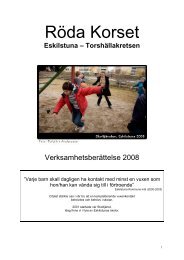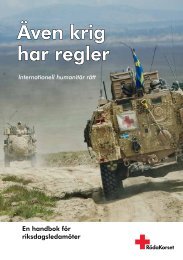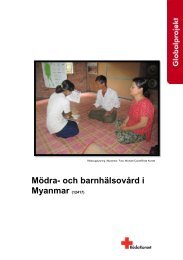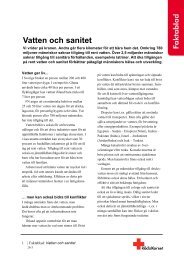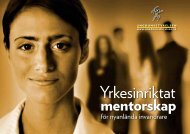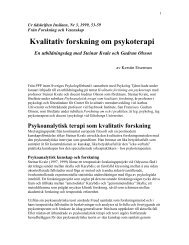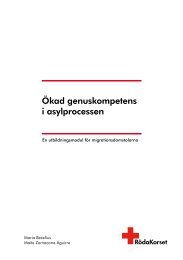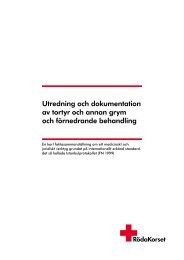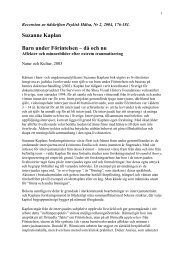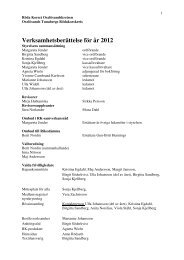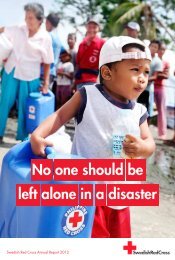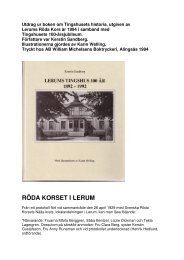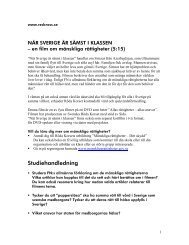chapter 4 - DRK
chapter 4 - DRK
chapter 4 - DRK
Create successful ePaper yourself
Turn your PDF publications into a flip-book with our unique Google optimized e-Paper software.
Strictly under embargo until Wednesday 22 September at 00:01 GMT (02:01 Geneva time)At the same time, many of the world’s largest cities are relatively secure, proving thaturban settings are not automatic backdrops for murder and mayhem. With enoughleadership, imagination and cooperation, solutions can be found to make the 21stcentury metropolis a safe and desirable place to live.Box 4.2 Red Cross Red Crescent actionThe Red Cross Red Crescent strives to preventurban violence by improving children’s self-esteem,teaching them skills and demonstratingpeaceful resolution of conflict. In Sierra Leone,where children suffered through 11 years ofcivil war and were often made to fight, the SierraLeone Red Cross Society developed childadvocacy and rehabilitation centres (since expandedto Liberia). The programme offers psychosocial,educational and vocational trainingto war-affected youth and ex-combatants,helping them to reintegrate their communities.In South Africa, a programme entitled ‘Socceragainst crime’ brings young people of differentbackgrounds together to play the sport, to helpend the kind of discrimination and violenceagainst foreigners that devastated Gautengprovince in 2008.In Central America and the Caribbean, theSpanish Red Cross runs a violence preventionproject with eight countries. It targets youthleaders at risk and involves them in a varietyof social projects which differ from country tocountry. In Guatemala, they do theatre and singing.In Nicaragua, young people learn to makenecklaces and bracelets by hand and sell themin their communities. In the Dominican Republic,youth help to clean up national parks and coastlines.“Our work is to help them become partof their communities,” Juan José Martinez Solis,violence prevention coordinator for the SpanishRed Cross, told the World Disasters Report.A Canadian Red Cross programme calledRespectED teaches children and youth to stopbullying, harassment, dating violence andabuse. It has been expanded to urban settingsin Sri Lanka and Guyana. And in Norway, theRed Cross has a street mediation programme,where young people teach their peers how tocommunicate peacefully and manage conflict.A standby mediation team intervenes in ongoingconflicts, such as those between gangs.When Michel Minnig, former head ofthe International Committee of the Red Cross(ICRC) in Southern America, arrived in the regionin 2004, he was struck by the gravity ofthe situation in Rio’s favelas. As he explained,“The consequences for the civilian populationof this armed violence in an urban setting weresimilar to the ones we used to see in an armedconflict – people killed and wounded, a lackof infrastructure, a whole range of tension andabuse.” Minnig was one of the early proponentsof ICRC action to help improve dignityfor and respect towards the most vulnerable inhabitantsof Rio’s favelas. And so in December2008, the organization launched a pilot projectin seven of the city’s most wretched slums.Since then, the ICRC, the Brazilian RedCross and other local and state actors havestarted to work together, conducting first-aidtraining for residents, ensuring access to medicalcare including mental health, addressingthe situation of adolescent mothers andtheir children, working with seven schools toimprove humanitarian values and space intheir surroundings. Very importantly, the ICRCworks with the police to integrate internationalWorld Disasters Report 2010 – Focus on urban risk87



